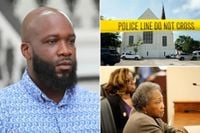At 5:30 a.m. on July 24, 2025, Jarvis McKenzie sat in his car at the edge of his neighborhood in Richland County, South Carolina, waiting for his supervisor to pick him up for work—something he’d done every morning for a year. But on this particular morning, the routine was shattered. A white man, later identified as 34-year-old Jonathan Felkel, pulled up in a car, locked eyes with McKenzie, and, as captured on security footage, picked up a rifle. Felkel fired through McKenzie’s open car window and shouted, “you better get running, boy!” as McKenzie scrambled for cover behind a brick wall. The shooter then drove off into the neighborhood, leaving McKenzie shaken and terrified.
McKenzie, a Black man, recounted the ordeal a month later, saying, “It’s heartbreaking to know that I get up every morning. I stand there not knowing if he had seen me before.” Since the attack, he says, every trip outside is clouded by unease and fear. “I feel like somebody is watching me. I feel like I’m being followed,” McKenzie told reporters, adding, “It spooked me.”
The crime, which authorities and McKenzie’s attorney say was clearly motivated by racial hatred, has reignited a long-simmering debate over hate crime legislation in South Carolina. The state is one of only two in the nation—alongside Wyoming—that does not have a statewide hate crime law. According to AP and other news outlets, this legislative gap has become an increasingly sore spot, especially since the 2015 massacre at Charleston’s Emanuel AME Church, where nine Black worshippers were killed in a racially motivated attack.
After the Charleston tragedy, calls for a hate crime law intensified. Business leaders, survivors of the massacre, and even some Republicans joined the push. The South Carolina House of Representatives passed a hate crime bill in 2021, and again in 2023. But both times, the measure stalled in the Senate, never making it to a floor vote. Supporters say Republican Senate leadership knows the bill would pass if allowed to proceed, as moderate members of their own party support it. Instead, the bill remains buried on the legislative calendar, often discussed only in passing as senators debate other issues. During a May 2023 debate over history curriculum guidelines, a longtime Democratic lawmaker asked Senate Majority Leader Shane Massey why hate crimes legislation couldn’t get a vote. Massey responded, “The problem right now is there is a number of people who think that not only is it feel good legislation, but it is bad legislation. It is bad policy not because people support hate but because it furthers division.”
In the absence of a statewide law, about two dozen local governments in South Carolina—including Richland County—have enacted their own hate crime ordinances. These local laws, however, are limited in scope: they only cover misdemeanors and carry maximum sentences of one month in jail. The Richland County ordinance was used to charge Felkel, making his case the first such prosecution under the local law. He also faces charges of assault and battery of a high and aggravated nature, which could bring up to 20 years in prison if convicted, as well as possession of a weapon during a violent crime. According to authorities, Felkel admitted after his arrest that he fired at McKenzie because of McKenzie’s race.
Richland County Sheriff Leon Lott, who pushed for the local hate crime ordinance, believes the need for explicit hate crime protections is obvious. “It’s common sense. We’re making something very simple complicated, and it’s not complicated. If you commit a crime against somebody just because of the hate for them, because of who they are, the religion, etcetera, we know what that is,” Lott said. He added, “I think it’s very important that we protect everybody. My race, your race, everybody’s race, your religion, there needs to be some protection for that. That’s what our Constitution gives us.”
Supporters of a state-level hate crime law argue that relying on federal statutes is inadequate. While the perpetrator of the Charleston church massacre was prosecuted under federal law and is now on federal death row, local officials point out that federal authorities have limited resources, cannot prosecute cases involving juveniles, and must prioritize cases from afar in Washington, D.C. “The subliminal message that says if you’re racist and you want to commit a crime and target somebody for their race, gender, ethnicity, sexual orientation or whatever it is you can do it here,” said Tyler Bailey, McKenzie’s attorney. He argues that the lack of a state law emboldens white supremacists and sends a dangerous message of tolerance for hate-driven violence.
Despite this, state-level opposition remains strong. Republican Governor Henry McMaster, a former prosecutor, understands why local governments are passing their own hate crime ordinances, but believes existing state laws against assault and violent crime are sufficient. “There’s no such thing as a love crime. There is always an element of hatred or disrespect or something like that,” McMaster said. He worries that hate crime legislation risks “policing thought or speech,” and maintains that judges already have the discretion to impose maximum sentences if they determine hate was a motivating factor.
Yet, many see this argument as insufficient. Senate Democrats have expressed frustration that, while the Senate has debated harsher penalties for attacks on health care workers and police dogs, hate crime legislation continues to languish. For those like McKenzie and the survivors of the Charleston massacre, the lack of progress feels like a painful reminder that the state has not fully reckoned with the realities of racially motivated violence. “It’s heartbreaking,” McKenzie said, reflecting on how his life has changed since the attack. “I stand there not knowing if he had seen me before.”
As the case against Felkel proceeds, the debate over hate crime legislation in South Carolina remains as fierce as ever. Supporters continue to push for a law that would add years to sentences for crimes proven to be motivated by bias, while opponents insist that current statutes are enough. The state’s resistance to change, however, leaves victims like McKenzie feeling exposed and unsupported. “I feel like somebody is watching me. I feel like I’m being followed,” he said. “It spooked me.”
The shooting of Jarvis McKenzie has once again cast a harsh spotlight on South Carolina’s refusal to enact a statewide hate crime law. For many, the question remains: how many more victims will it take before the state acts?





